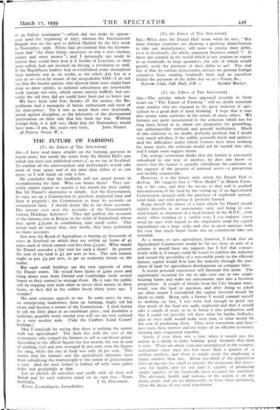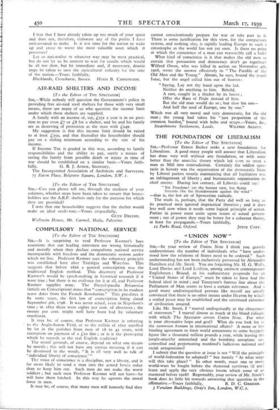[To the Editor of THE SPECTATOR] SIR,—The articles which have
appeared recently in three issues on " The Future of Farming " will no doubt stimulate your readers who are engaged in the great industry of agri- culture to a good deal of hard thinking. I hope that it may also arouse some curiosity in the minds of many others. We farmers are quite accustomed to the criticism which has for long been levied at us about our propensity for grumbling, our unbusinesslike methods and general inefficiency. Much of this criticism is, no doubt, perfectly justified, but I doubt very much whether, if the public generally knew and appreci- ated the difficulties under which farmers have been working for many years, the criticism would not be turned into pity, and I might even suggest shame.
fhe average townsman thinks that the farmer is constantly subsidised in one way or another, he does not know or realise that the farmer is actually subsidising the consumer at the expense of the greatest of national assets—a prosperous and healthy countryside.
However, it is the future with which Sir Daniel Hall is dealing. He suggests that a " New Model " in British Farm- ing is the cure, and that the means to that end is gradual nationalisation of the land by the setting up of an Agricultural Commission charged with the purchase of neglected agricul- tural land, and with getting it properly farmed.
Being myself the owner of a farm which Sir Daniel would rightly describe as an uneconomic unit, and being in con- stant touch, as chairman of a local branch of the N.F.U., with many others farming in a similar way, I can endorse every word he says with regard to the imperative need for capital expenditure on a large scale, and also in great measure with his view that much larger farms run on commercial lines arc essential.
As a means to save agriculture, however, I think that an Agricultural Commission would be far too slow; as part of a scheme it would have my support, but I feel that concur- rently with it, if means could be found to stabilise the industry and ensure the possibility of a reasonable profit to the efficient farmer, capital would flow into the industry through the pur- chase of land for agricultural development on company lines.
A recent personal experience will illustrate this point. The opportunity occurred for me to take over one or two neigh- bouring farms and make my uneconomic unit into a business proposition. A couple of friends from the City became inter- ested, saw the land in question, and after doing so asked me what return I considered the capital invested would be likely• to yield. Being only a farmer I would commit myself to nothing—in fact, I was even fool enough to point out that much of the land was sadly neglected and that it would take a couple of years or so w bring it into production, and that I could not possibly tell them what fat lambs, bullocks, pigs or even milk would make next year, or what would be the cost of producing them. They were townsmen and busi- • ness men, their interest and my hope of an efficient economic farming unit evaporated together.
Surely if ever there was a time when it would pay the nation as a whole to make farming good business that time is now. There are about 2,000,000 unemployed in the country, agriculture since 1921 has lost more than a quarter of a million workers, and there is ample scope for employing a larger number than this. About one-third of the population have an income too small to provide the minimum diet neces- sary for health, and yet our land is capable of producing ample supplies of the foodstuffs most essential for nutrition. The physique, health and stamina of the nation is on the down grade, and yet we deliberately, or from sheer ignorance, allow the decay of our rural population.
I fear that I have already taken up too much of your space and dare not, therefore, elaborate any of the points I have endeavoured to make. Is it not time for the nation to wake up and cease to waste the most valuable asset which it possesses?
Let us nationalise in whatever way may be most practical, but do not let us be content to wait for results which would be all too slow, but let immediate and, if necessary, drastic steps be taken to save the agricultural industry for the sake of the nation.—Yours faithfully,
Blacklands, Crowhurst, Sussex. HUGH B. CARRINGTON.











































 Previous page
Previous page